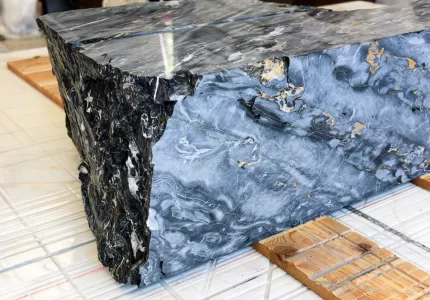In the canvas of modern home design, sustainability paints the dominant hue. Among the myriad of options, granite countertops stand out, not just for their aesthetic appeal but for their eco-friendly attributes. This article peels back the layers to reveal the sustainable and eco-friendly aspects of granite countertops, promising a blend of beauty and responsibility.
Section 1: The Roots of Sustainability – Sourcing and Origin of Granite Granite, a natural stone, begins its journey deep within the earth. The process of quarrying granite, when done responsibly, aligns with environmental stewardship. Certain regions and quarries are champions of eco-friendly practices, ensuring minimal disturbance to the surrounding ecosystem. They implement sustainable measures like water recycling and land reclamation, ensuring that after the quarry’s productive life, the land can return to its natural state.
Insight: Discovering the origin of your granite countertop not only tells a story but also ensures that your choice supports ethical and sustainable quarrying practices.
Section 2: Carving Efficiency – Energy-Efficient Quarrying and Processing The journey from quarry to kitchen involves numerous processes, each with its own energy footprint. Modern quarries utilize advanced machinery to optimize energy use. Techniques such as water recycling in stone cutting and diamond wire saws reduce energy consumption and minimize waste. The focus on energy-efficient practices in the extraction and processing stages underscores granite’s role in sustainable building.
Example: A quarry that recycles water for stone cutting reduces its water consumption by up to 70%, showcasing a commitment to sustainability.
Section 3: Timeless Durability – Longevity as a Pillar of Sustainability One of the most compelling arguments for granite countertops is their longevity. Granite’s resilience means it can withstand the rigors of daily use without succumbing to wear and tear. This durability translates to fewer replacements, less waste, and a reduced demand for resources. By choosing granite, homeowners make a long-term investment in sustainability.
Real-Life Scenario: A family that installed granite countertops decades ago finds them as functional and stylish today as they were on day one, epitomizing sustainable living.
Section 4: The Afterlife of Granite – Recycling and Reusing Even offcuts and remnants from granite processing have a life beyond the countertop. These pieces find new purposes in home projects, such as backsplashes, flooring, or even outdoor landscaping. This practice of recycling and repurposing not only reduces waste but also sparks creativity, turning leftovers into features.
Creative Tip: Use granite remnants to create a matching cutting board or a unique garden pathway, blending sustainability with style.

Section 5: Breathe Easy – Low VOCs for Indoor Air Quality Indoor air quality is a significant aspect of a healthy home. Granite countertops contribute positively by emitting low or no volatile organic compounds (VOCs). Unlike some synthetic materials that release harmful chemicals, granite maintains a clean bill of health, ensuring that your home’s air stays as pure as nature intended.
Health Note: Opting for natural stone like granite helps maintain a toxin-free home environment, crucial for wellbeing.
Section 6: Caring for Granite – Eco-Friendly Maintenance Maintaining the pristine condition of granite countertops doesn’t require harsh chemicals. Simple, eco-friendly cleaning solutions can keep your granite spotless. A mix of mild soap and water, or baking soda for tougher stains, proves that effective cleaning doesn’t have to compromise the planet.
Eco-Hack: Use a paste of baking soda and water to gently scrub away stubborn stains, keeping your countertops and the environment clean.
Section 7: The Local Advantage – Benefits of Local Sourcing Transportation is a significant contributor to carbon emissions. Choosing locally sourced granite reduces transportation distance, thereby cutting down on carbon footprint. Local sourcing also supports local businesses, making it a win for the environment and the community.
Sustainability Tip: Explore granite options near you. Reducing transportation distance is a simple yet effective step towards a greener home renovation.
Section 8: Weighing Options – Granite vs. Other Materials When stacked against other popular countertop materials like quartz or laminate, granite holds its own in sustainability. Unlike materials that rely on industrial processing, granite’s natural origin and minimal treatment align with eco-friendly principles. Its durability also means less turnover and waste, marking it as a choice that benefits the planet over the long term.
Consideration: Compare the lifecycle and sustainability of different countertop materials. Granite’s natural origin and longevity often give it an environmental edge.
Granite countertops bring more than just natural beauty to your home; they carry the banner of sustainability. From responsible sourcing and energy-efficient processing to their enduring lifespan and low VOC emissions, granite countertops offer a way to make your home both beautiful and eco-conscious. As the world leans more towards sustainable






